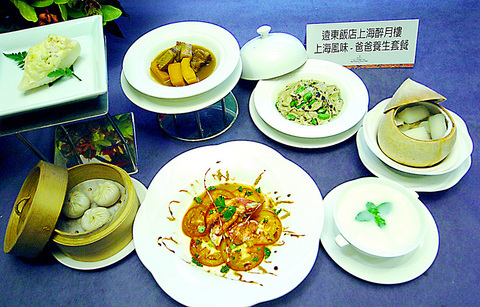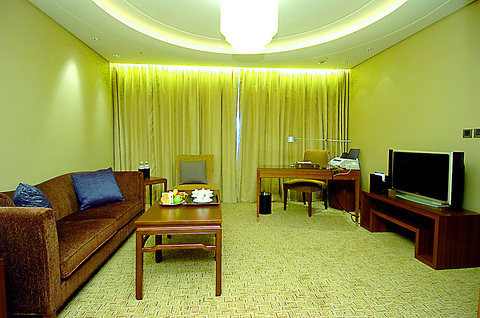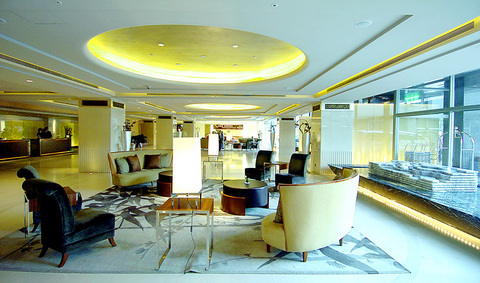Choosing a hotel can be such a headache. Few travelers want to settle for a roach-infested room but many are also reluctant to part with, say, NT$10,000 to NT$20,000, for a place to stay. That's the old guest mentality. The Sheraton Taipei Hotel has spent NT$2.4 billion on renovations in anticipation of the new guest mentality: A hotel is more than just a place to stay.
While the Sheraton's outer appearance hasn't changed much, the renovations begun in April 2003 have just reached completion. There is a new lobby, new restaurants and a new look for the rooms themselves, including two floors of new "executive" rooms, claimed to be the best in Taipei.
Once known as the Lai Lai Sheraton, the 26-year-old hotel is within walking distance from the Executive, Control and Legislative Yuans and has gained a reputation over the years as a favorite hangout for politicians.

PHOTOS: SUNG CHI-HSIUNG, TAIPEI TIMES
Owned by the super-wealthy Tsai family, the Lai Lai became a hotbed of power and intrigue. In 1985, a Tsai-family financial scandal involving the Taipei Tenth Credit Cooperative and Cathay Plastics resulted in the hotel changing hands. In 2002, Tsai brothers Chen Yiang (
Austrian hotelier Josef Dolp was general manager of the hotel in the years leading up to the renovations. While they were underway, he served as general manager at the Sheraton in Xian, China. He returned to his post at the Sheraton Taipei this June.
"The Lai Lai Hotel had an old Chinese feel to it and the design was very local," said Dolp. "We did so much renovation that we also wanted to change the market mix and the kind of custo-mers we attract."

While Dolp acknowledged that his hotel's location meant political clientele would be a mainstay, he said the new target groups are international businesspeople and Taiwanese 30-somethings. This shift is reflected in the hotel's new look and feel, which is clean and structured, simple as opposed to busy, and focuses on functionality and timelessness. These are aesthetic virtues appreciated not only by international businesspeople, but also by young people, according to Dolp.
Owner Tsai Chen-yang and his wife Ellie Lai (
"Our hotel reflects the status quo of the story of Taiwan," Dolp said, pointing to the classical Japanese influence that is most apparent on the rigidly straight, elegant wood that lines bedroom walls.

While a beautiful, comfortable interior is important, it is the process and the experience that will bring customers back and give the hotel a competitive edge, Dolp says.
The management has adopted an approach to service that centers on customer feedback instead of hotel traditions. While it is common practice for the bellboy to whisk away a guest's luggage the moment they check in, surveys revealed this to be an annoyance for many guests, especially businesspeople who want to have their work with them at all times.
The goal, Dolp says, is to make the hotel experience as efficient as possible while still maintaining a friendly, human touch. And despite the amount that was spent on upgrading the hotel's appearance, in the end it's the people and the experience that count for the most.

"It's like a one-night stand with a beautiful lady," Dolp said. "If you find out she's stupid, you won't sleep with her again. So we want to be a beautiful lady who is smart so you'll fall in love and come back over and over again."


This year will go down in the history books. Taiwan faces enormous turmoil and uncertainty in the coming months. Which political parties are in a good position to handle big changes? All of the main parties are beset with challenges. Taking stock, this column examined the Taiwan People’s Party (TPP) (“Huang Kuo-chang’s choking the life out of the TPP,” May 28, page 12), the Democratic Progressive Party (DPP) (“Challenges amid choppy waters for the DPP,” June 14, page 12) and the Chinese Nationalist Party (KMT) (“KMT struggles to seize opportunities as ‘interesting times’ loom,” June 20, page 11). Times like these can

June 23 to June 29 After capturing the walled city of Hsinchu on June 22, 1895, the Japanese hoped to quickly push south and seize control of Taiwan’s entire west coast — but their advance was stalled for more than a month. Not only did local Hakka fighters continue to cause them headaches, resistance forces even attempted to retake the city three times. “We had planned to occupy Anping (Tainan) and Takao (Kaohsiung) as soon as possible, but ever since we took Hsinchu, nearby bandits proclaiming to be ‘righteous people’ (義民) have been destroying train tracks and electrical cables, and gathering in villages

Dr. Y. Tony Yang, Associate Dean of Health Policy and Population Science at George Washington University, argued last week in a piece for the Taipei Times about former president Ma Ying-jeou (馬英九) leading a student delegation to the People’s Republic of China (PRC) that, “The real question is not whether Ma’s visit helps or hurts Taiwan — it is why Taiwan lacks a sophisticated, multi-track approach to one of the most complex geopolitical relationships in the world” (“Ma’s Visit, DPP’s Blind Spot,” June 18, page 8). Yang contends that the Democratic Progressive Party (DPP) has a blind spot: “By treating any

Swooping low over the banks of a Nile River tributary, an aid flight run by retired American military officers released a stream of food-stuffed sacks over a town emptied by fighting in South Sudan, a country wracked by conflict. Last week’s air drop was the latest in a controversial development — private contracting firms led by former US intelligence officers and military veterans delivering aid to some of the world’s deadliest conflict zones, in operations organized with governments that are combatants in the conflicts. The moves are roiling the global aid community, which warns of a more militarized, politicized and profit-seeking trend